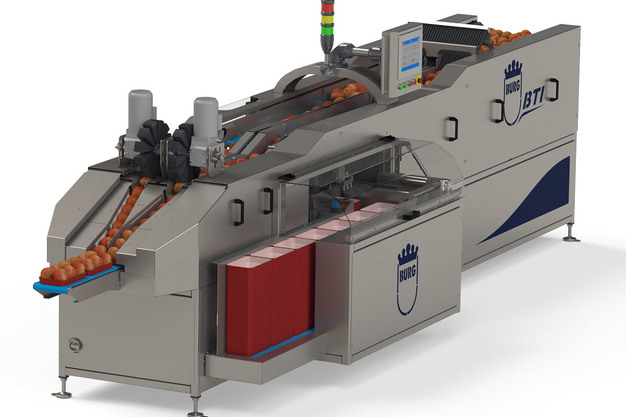"The labor factor weighs heavily on the production process," begins Peter Vonk, Technical Advisor at Looije Packing. This Dutch company specializes in packaging fruit and vegetable packaging. That burden, he says, explains the desire to automate packing apples into trays, a job previously done by hand. "Minimum wages are rising, and labor is becoming increasingly expensive while remaining scarce."

"It's been, and still is, challenging to retain casual workers, given the seasons' volatility and transitions," Peter points out. That, while continuity remains essential, even when packing apples. "We know better than anyone how difficult it is to recruit and keep staff. That's why we try to adapt the job process so it's as easy as possible to enter. By mechanizing things, we've taken the first steps in that. Ultimately, every part you don't mechanize is an extra worker you must employ to do checks."
Attractive investment
At Looije Packing, automation led to a half to two-thirds saving on people on the apple packing line, Peter notes. "Then you can calculate the automation investment - especially with today's wages - and investing in automation or robotization becomes very attractive," he says, pointing out that for tray filling - besides someone to do the input and an operator - only visual quality control and positioning the apples in the packaging is manual work.
The technical advisor also sees the potential for further automation, in time. "Today's trend is toward making inroads with robotic arms, cobots, and spider robots," Peter states, adding that in the future, spider robots could, for example, perfectly take over the manual positioning of apples in the packaging for the best presentation.
Solutions for limited spaces
While sorting is often done at packaging facilities, Looije Packing does not do that. It works with products sorted elsewhere. Mechanizing its packing process, therefore, looks different, says Peter. "It's different from many other companies who work directly from the source in a focused way. That sometimes makes it difficult for us to find an appropriate solution, and often leads to what I call a 75% solution. Then you must find someone to add the remaining 25%," he explains.
Part of the line around the BTI tray filler for round products is custom-built. Supplier Burg Machinery found a way to fit the entire line in a limited space. Peter can conclude that, three seasons later, that was a success.
Input tracks controlled separately
Since they work with pre-sorted products, Looije Packing deems it vital that the different input tracks be controlled separately. "That was a specific task when looking to start automating. We pack four to eight pre-graded, imported apples in a kilogram tray. To pack, say, six apples, we mix two sizes - four small, two larger - to get as close to a kilo as possible. The beauty of the BTI machine is that we can control each input track - one track a little faster or slower - independently of the other. That lets us make such mixes." Peter says once packaged, all the packs run over a checkweigher, and those weighing less than a kg are repacked.
Creative with space
Peter reckons a lack of space is often inherent to packaging sites, which proves challenging. "We often work indoors at large storage and handling companies. Then you have limited room so you must get more creative with your solutions," he states. One is to make a particular packaging line suitable for a specific product. That is possible, Vonk points out, because a packaging line's input and output sides are often the same, so only the machine needs to be switched.
Like, say, transitioning from apples - that season is now over at Looije Packing - to grapes. "Most apples are packed in cardboard, such as wing trays, or in stretch film. Grapes, though, often go into a top seal or flow pack packaging. That requires another machine, but, nine times out of ten, the input and output parts are the same. So there's plenty to automate with such a packaging machine." That is where, for instance, a palletizer or automatic strapping come into the picture. "Those solutions are becoming increasingly compact. That’s where you can be profitable these days," Peter concludes.
Looije Packing
Tel: 06 57437236
Peter Vonk
[email protected]
www.looijepacking.com
https://www.burgmachinefabriek.nl/machines/trayvuller/










